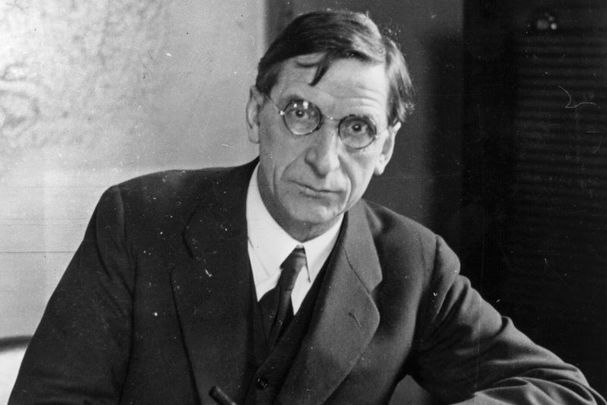Top Stories
Éamon de Valera’s Machiavellian Legacy Haunts Irish History

UPDATE: Éamon de Valera’s complex legacy is back in the spotlight as new insights reveal his Machiavellian tactics that shaped Irish history and impacted Michael Collins’ fate. A recent retrospective highlights their fraught relationship and the consequences of de Valera’s political maneuvers during a pivotal time in Ireland’s struggle for independence.
The examination comes just as historians and scholars reflect on the tumultuous events surrounding the establishment of the Irish Free State in the early 20th century. This retrospective draws attention to how de Valera’s actions not only influenced his political trajectory but also led to significant repercussions for Collins, who was a key figure in the fight for independence.
In June 1975, a personal encounter with de Valera at a gathering in Dublin left a lasting impression on attendees, showcasing his political gravitas even at the age of 92. The late president’s presence is remembered as a symbol of Ireland’s ongoing struggle for sovereignty—a legacy intertwined with the fate of Collins, who had been assassinated just 53 years earlier.
As Michael Collins has slowly reemerged as a national hero, recent scholarship, including Margery Forester’s biography, underscores how de Valera’s political strategies sought to minimize Collins’ contributions to the independence movement. De Valera’s long political career was characterized by a series of calculated decisions and alliances that often sidelined Collins and other revolutionary figures.
Among the most controversial aspects of de Valera’s leadership were his policies during World War II, where his stance of neutrality raised eyebrows. However, his actions, such as sending aid to Belfast during bombing raids and managing German diplomatic relations, reveal a complex balancing act that prioritized Ireland’s sovereignty while navigating the global conflict.
The retrospective also touches on de Valera’s notorious “abdications,” particularly his departure for the U.S. in May 1919 during a critical phase of the War of Independence—a move that allowed Collins to take charge of the revolutionary efforts. Collins’ effective leadership during this period, including the notorious Bloody Sunday operation, showcased his strategic prowess, which starkly contrasted de Valera’s absence.
De Valera’s relationships with other leaders, including Richard Mulcahy, further illustrate his Machiavellian approach. De Valera’s advice to study Machiavelli reinforced his reputation for political cunning, as he often prioritized his ambitions over the collective revolutionary goals.
Amidst the brewing tensions leading up to the 1921 Treaty, de Valera’s failure to negotiate directly with the British left Collins to navigate a treacherous political landscape alone. Collins’ signing of the Treaty, which he deemed his “death warrant,” ultimately created a rift that led to the Irish Civil War, a division that persists in discussions on Irish identity and governance.
What emerges from this latest analysis is a clearer understanding of how de Valera’s strategic decisions, often viewed through a Machiavellian lens, not only shaped his political legacy but also altered the course of Irish history. The ramifications of his actions continue to fuel debate among historians and political analysts, emphasizing the need for a nuanced understanding of this significant period.
As the conversation around Éamon de Valera and Michael Collins evolves, it becomes evident that their intertwined legacies will remain a point of contention and reflection in Ireland’s historical narrative. The emotional weight of their stories resonates with a nation still grappling with its past.
Stay updated with the latest developments in Irish history and politics by following us. This ongoing discourse highlights the complexities of leadership, legacy, and the enduring impact of decisions made in the crucible of revolution.
-

 Top Stories3 months ago
Top Stories3 months agoTributes Surge for 9-Year-Old Leon Briody After Cancer Battle
-

 Entertainment4 months ago
Entertainment4 months agoAimee Osbourne Joins Family for Emotional Tribute to Ozzy
-

 Politics4 months ago
Politics4 months agoDanny Healy-Rae Considers Complaint After Altercation with Garda
-

 Top Stories4 months ago
Top Stories4 months agoIreland Enjoys Summer Heat as Hurricane Erin Approaches Atlantic
-

 World5 months ago
World5 months agoHawaii Commemorates 80 Years Since Hiroshima Bombing with Ceremony
-

 Top Stories3 months ago
Top Stories3 months agoNewcastle West Woman Patricia Foley Found Safe After Urgent Search
-

 Top Stories5 months ago
Top Stories5 months agoFianna Fáil TDs Urgently Consider Maire Geoghegan-Quinn for Presidency
-

 World5 months ago
World5 months agoCouple Convicted of Murdering Two-Year-Old Grandson in Wales
-

 World5 months ago
World5 months agoGaza Aid Distribution Tragedy: 20 Killed Amid Ongoing Violence
-

 World5 months ago
World5 months agoAristocrat Constance Marten and Partner Convicted of Infant Murder
-

 Top Stories4 months ago
Top Stories4 months agoClimbing Errigal: A Must-Do Summer Adventure in Donegal
-

 Top Stories4 months ago
Top Stories4 months agoHike Donegal’s Errigal Mountain NOW for Unforgettable Summer Views









